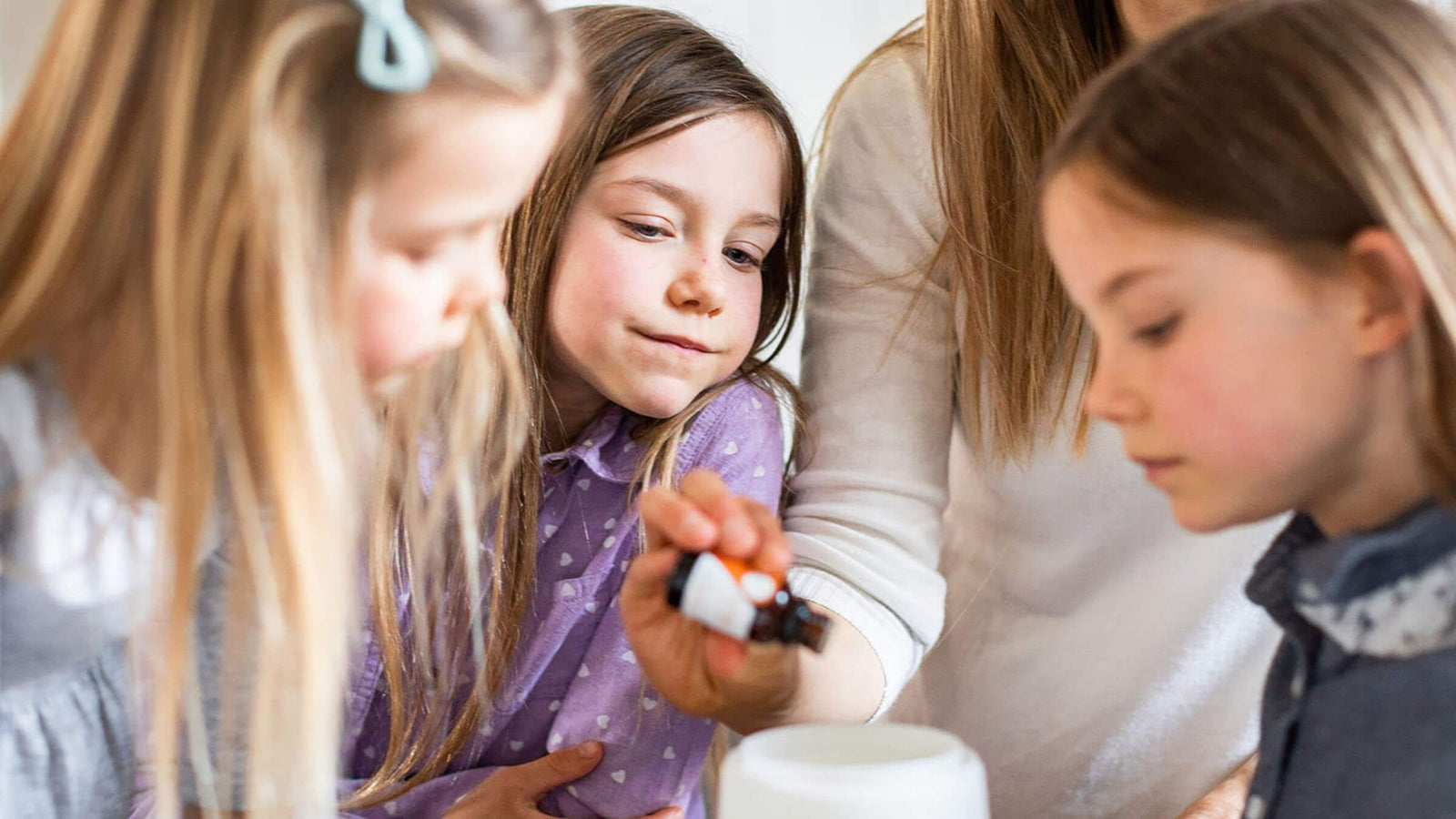Basic essential oil safety

Basic essential oil safety
Dilute with a carrier before putting essential oils on your skin
You’ll hear us say this a lot … essential oils are incredibly potent! Diluting helps them go farther, and most importantly, protects your skin from irritation and your body from potential negative reactions.
So what’s a carrier? Carriers include a range of substances from jojoba oil to bentonite clay to aloe vera that you can use as a base for drops of essential oil. The major categories are butters, waxes, oils, gels, lotions, soaps, salts, clays, and resins. Some carriers even have additional skin nourishing or therapeutic benefits.
One common misconception is that you can use water as a carrier for essential oils. It works fine when you are using a diffuser, or in instances when the oil will not come into direct contact with your body, but as you may remember from chemistry class, oil and water don’t mix. The oil will remain separate and intact, rather than dispersed and blended, defeating the purpose of adding your carrier and putting you at risk for negative reactions.

How to dilute essential oils
You may see instructions that call for a 2% dilution and feel a bit confused. We can help translate that into the simplest terms — drops! Depending on the situation, the strength of the oil you are using, and the person you’ll be using it on, there are different recommended dilution ratios to follow. Below is a basic chart for topical use, to help you get started.

When you first start using a new oil, we recommend diluting, doing a patch test, and watching your body for any reactions, like redness, itching, rashes, headaches, or dizziness.
Learn more about dilution guidelinesCan you take essential oils internally?
There is a lot of conflicting information on the internet about whether or not the internal use of essential oils is safe. You may even hear of people throwing a few drops into a glass of water and chugging them down. We don’t recommend doing this for many reasons.
- Once again, essential oils are incredibly potent!
- Oil and water don’t mix, causing the oils to remain separate and fully concentrated, entering your system and clinging to your internal tissues at full strength.
- Ingestion has the potential to cause many issues, including build up in the liver, stomach irritation, burning or ulceration of the esophagus, and allergic reactions.
- It is just as effective and much safer to use essential oils in other ways, like inhalation or topical application.
To add to the confusion, you may notice that some essential oils are labeled food safe or food grade. Unfortunately, that has more to do with certification and labeling technicalities than it does with the safety or the quality of the essential oil.
The FDA doesn’t regulate or classify any essential oils as food grade. It does designate some oils as “appropriately regulated indirect additives” and calls them Generally Recognized as Safe (GRAS) for human consumption when used for their intended purpose. Intended purpose represents a significant gray area, as it is not clearly defined. Food manufacturers use certain oils in very low concentrations as flavor additives in large quantities of food, which is significantly different than a person who decides to drink multiple drops of essential oil per day. GRAS status does not indicate that taking essential oils will have a therapeutic effect or should be considered safe at any dose.
There are cases in which internal use of essential oils can be safe, but it requires significant training, and may not result in greater effectiveness. Our rule of thumb, especially for beginners, is to stick with tried and true, safe methods of use and stay away from ingesting essential oils. If you wouldn’t feel comfortable eating pounds of lemon rind, then you probably wouldn’t want to eat lemon essential oil either!
Keep track of shelf life
Not all essential oil companies will tell you this, but each oil has a shelf life! Essential oils oxidize when exposed to oxygen or heat, breaking them down and reducing their therapeutic qualities. It’s important to buy essential oils from a company that lists the batch date and shares shelf life information with you so that you can be aware of exactly what you are getting and how long it will be of maximum use.
There’s no need to throw your essential oils away after they have expired, you can still use them in cleaning blends.
Extend the life of your essential oilsUsing essential oils with children
Children’s systems are more sensitive than adults, so you’ll need to use extra care and caution when it comes to essential oil safety.Oils to avoid with children under 10:
- Eucalyptus Oil (Eucalyptus globulus, Eucalyptus radiata, Eucalyptus smithii)
- Saro Oil (Cinnamosma fragrans)
- Ravintsara Oil (Cinnamosma camphora ct. 1,8-cineole)
- Rosemary Oil (Rosmarinus officinalis ct. 1,8-cineole)
- Niaouli Oil (Melaleuca quinquenervia ct. 1,8-cineole)
- Cinnamon Oil (Cinnamomum zeylanicum)
- Tulsi Oil (Ocimum sanctum ct. eugenol)
- Clove Bud Oil (Eugenia caryophyllata)
- Wintergreen Oil (Gaultheria fragrantissima)
- Birch Oil (Betula lenta)
- Hyssop Oil (Hyssopus officinalis)
- Corn Mint (Wild Mint) Oil (Mentha arvensis)
- Cajeput Oil (Melaleuca leucadendron var. cajuputi)
- In addition, we recommend avoiding Peppermint Oil (Mentha × piperita) with children under 5 years old, especially around the face, as it can cause breathing issues.
Critical safety guidelines:
- Stick with a 1% dilution when putting oils on children’s skin. That’s just 5 to 6 drops of essential oil in one ounce of a carrier product.
- Keep an eye out for reactions. If a child develops a skin reaction where the oils have been applied, wash the area for 15-20 minutes with soap and water, then use a soothing moisturizer like coconut oil after the bath.
- If reactions are more serious than skin irritation, get immediate medical help.
- For children under 5 years old, stick to hydrosols (gentle and safe aromatic waters created by distilling plant material) or diffusing oils at very low drop counts.
- Do not allow children to ingest essential oils. If your child accidentally swallows oils, do not induce vomiting. Call your poison control center right away.
- Be aware that some oils, while safe to use with kids at a 1% dilution, cause sun sensitivity and increase the risk of burns. These oils include:
- Bergamot Oil (Citrus bergamia)
- Grapefruit Oil (Citrus paradisi)
- Lemon Oil (Citrus limon)
- Lime Oil (if it’s been cold-pressed) (Citrus aurantifolia)

There’s more to know about using essential oils with kids. So much so, that we have additional resources available if you’d like to know more.
Using essential oils with childrenUsing essential oils with pets
Like children, pets have sensitive systems. What’s more, your pets can’t communicate the way that humans can if something is distressing them, their senses of smell are far more advanced than ours, and we may not be able to recognize irritation in pets as easily as we can in humans.
Here are a few rules to keep in mind:
- Avoid putting essential oils on your pet’s fur or skin
- Don’t add essential oils to your pet’s food
- Store your essential oils safely in a place where your pets can’t get into them when you are not around.
- If you are using essential oils in a diffuser, make sure that it is in an open space and that your pet can escape to a different room if needed
- Make sure to place your diffuser in a location where your pet can’t knock it over
- If you suspect your pet has ingested essential oils or had some spilled on their skin, contact your vet immediately
Basic essential oil safety
Join Our Newsletter
Save 15% on your first order
Aromatherapy sent directly to your inbox. Receive tips, essential oil recipes, promotion alerts, live events and more. We look forward to connecting with you! *Exclusions apply.
